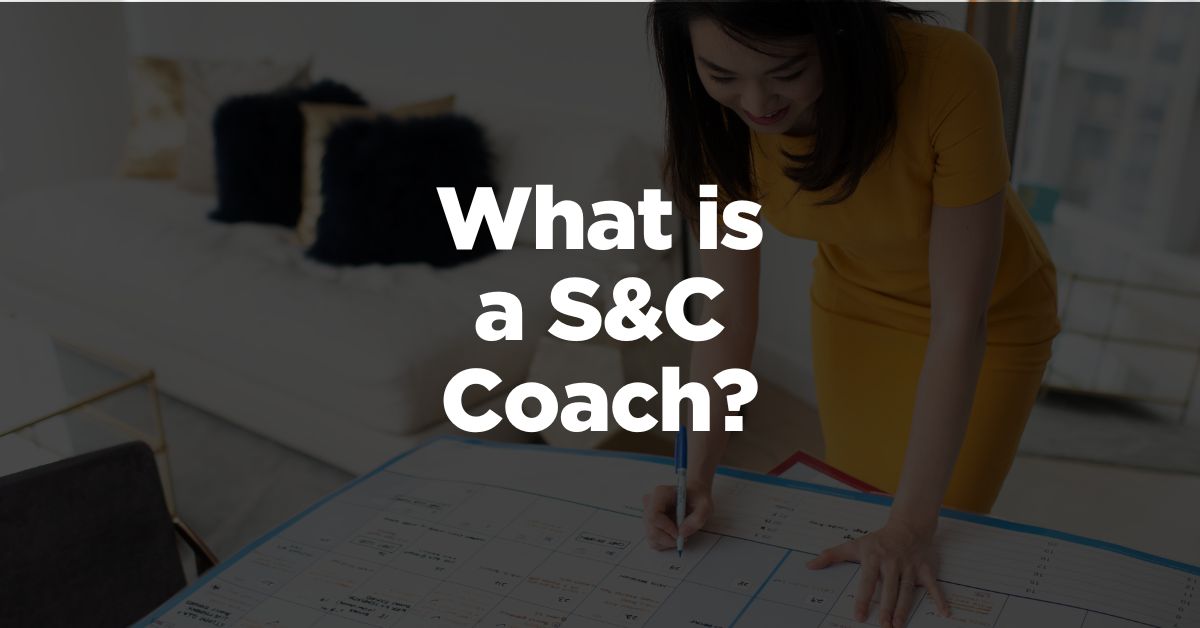Do you want to become a strength and conditioning coach? Then you’re in the right place.
By the end of this guide, you’ll know exactly how to launch a successful strength and conditioning coaching business.
Ready? Let’s get started.
Today, you’ll learn:
What is a strength and conditioning coach?
What does a strength and conditioning coach do?
What skills make a good strength and conditioning coach?
How to become a certified S&C coach
How much does a S&C coach make?
What is a strength and conditioning coach?
A strength and conditioning coach (also known as an S&C coach) helps their clients enhance their physical performance and capabilities. They place an emphasis on improving strength, endurance, flexibility, and overall conditioning.
Their primary focus is to help their clients develop a particular skill and improve performance over time with a tailored training plan. These plans include elements like strength training, aerobic conditioning, plyometrics, and agility drills.
But they can also help with other elements of fitness and wellness, including injury prevention, injury recovery, and nutrition.
S&C coaches work with a few main client bases: Institutions, professional athletes, and non-athletes.
Institutions and professional athlete settings can mean high school and college-level athletes as well as professional athletes on major sports teams.
In these kinds of settings, they work in tandem with sports coaches to evaluate the players and come up with a plan regarding what they should be working to improve. They might also maintain the S&C facility and put policies and procedures in place to keep everyone safe.
Get the Ultimate Guide
for building a
6-Figure Coaching Business so you can achieve more freedom!
A great strength and conditioning coach can work with all types of fitness levels.
For example, an S&C could help amateur runners learn proper form to enhance speed and reduce their risk of injury.
Strength and conditioning coaches can even work with people who aren’t athletes at all or simply don’t have an athletic goal.
For instance, an S&C coach might work with seniors to improve their daily movements to prevent falls and injuries.
Non-athletic clients could also see S&C coaches to improve things such as their mobility, stability, agility, endurance, power, and movement quality.
Regardless of a client’s athletic ability, there are several benefits of working with an strength and conditioning coach, including:
- Improved performance
- Greater strength
- Faster recovery
- Fewer injuries
- Greater health
Now that you understand what an S&C coach is, let’s talk about their main responsibilities.
What does a strength and conditioning coach do?
A strength and conditioning coach has two equally important focus areas.
The first is improving an individual’s athletic performance to enhance speed, form, power, strength, and endurance.
This is done by creating plans that:
- Focus on stride mechanics, explosive movements, and agility drills
- Improve exercise and movement techniques
- Incorporate plyometric exercises to increase strength and speed
- Target and build specific muscle groups to promote overall strength
- Focus on functional fitness
- Offer aerobic exercise and interval training to improve stamina
Their other focus is preventing and reducing athletic injuries through flexibility and mobility training, core strengthening, introducing new recovery strategies, and more.
Of course, the client you’re working with will change your approach.
With non-athletes, you’ll focus primarily on functional fitness.
In other words, you’ll help find ways to make everyday activities easier and less likely to cause injury. You’ll work with clients on things like balance, mobility, posture, strength, and stamina.
Clients who are athletes but not on a team (amateur athletes like runners) will focus on improving their technique and performance.
Programs for professional athletes will be more rigorous, but it all depends on the time of the season. In-season conditioning is often less difficult than off-season, as it focuses primarily on maintaining an athlete’s conditioning instead of improving it.
But what do S&C coaches actually do?
As a strength and conditioning coach, you’ll be responsible for:
- Assessing client strengths and weaknesses
- Creating training plans that target specific muscle groups, movements, and energy systems
- Working with sports coaches to monitor and measure an athlete’s performance and progress, as well as formulate strategies
- Collaborating with sports medical professionals to improve an athlete’s recovery processes
- Instructing clients on correct exercise techniques and proper form
- Designing training programs for athletes based on sport, position, and training objectives
- Regularly conducting fitness assessments to monitor a client’s strengths, weaknesses, and training requirements
Strength and conditioning coaches can work in a variety of settings. The setting you’ll work in will depend on your expertise, preferences, and client base.
In addition to institutions and with sports teams, you could work with clients in:
- Youth sports organizations
- Fitness centers and gyms
- Private training facilities
- Physical rehabilitation clinics
- Corporate wellness programs
- Military and law enforcement
Or you could work online. As research shows, online health coaching is as effective as face-to-face coaching.
And if you’re looking for flexibility and freedom, launching your online strength and conditioning coaching business is the best way to get it.
Want to find out if you have what it takes to be a good S&C coach? Keep reading!
What skills make a good S&C coach?
To be a good – or even great – strength and conditioning coach, you should be able to:
- Believe in your client: On a self-improvement journey, it’s crucial to have someone on your side. Get your clients to believe that they can achieve their goals, even if you can’t promise results.
- Offer candor: When your clients don’t want to hear the truth, it’s up to you to have those tough conversations that help them reframe and move forward when they’re struggling.
- Hold clients accountable: When a client’s dedication starts to waver, remind them of what they’re working toward and emphasize the steps they’ll have to take to get there.
- Actively listen to your clients: Be present in the conversation and provide feedback, ask clarifying questions, and paraphrase what the client is saying to show that you understand.
- Set the right goals: One of the most important parts of coaching is helping your clients set realistic, achievable goals based on where they currently are, where they want to be, and what’s keeping them from achieving them.
- Solve problems that your clients encounter: If one of the plans you’ve put in place for your client isn’t working, don’t just say you’re not sure why. Instead, work to find and solve the problem so they can improve.
With these skills in mind, let’s move on to how you can become a strength and conditioning coach.
Get the Ultimate Guide
for building a
6-Figure Coaching Business so you can achieve more freedom!
How to become a certified S&C coach
The truth is that becoming a strength and conditioning coach is about more than just your skills.
You also have to have the right kind of strategy and know exactly which steps to take, like finding your niche, getting certified, and marketing your services.
And right now, I’m going to show you exactly what you’ll need to do to be successful.
Education
If you want to work with organizations or schools, a Bachelor’s degree in a health science or fitness-related field will be enough. That includes majors like kinesiology, sports medicine, and exercise science.
Higher-level clients, like professional athletic teams, prefer S&C coaches with a Master’s degree.
That said, if you’re self-employed and own a strength and conditioning coaching business, you likely won’t need a degree or license to work with individuals.
But it’s important to note that this can vary based on your niche (such as nutrition), so be aware of any requirements before you start coaching.
Find a niche
Speaking of niches, finding yours is crucial!
S&C coaches with a niche stand out in the field and attract clients because they specialize in something specific.
To find your niche, think about your experience. Who do you help, and how?
You may have helped your grandparents enhance their well-being with functional exercises and balance improvement. That’s a niche!
Or maybe you’ve found your passion in helping young athletes get comfortable and confident playing their sport. That’s also a niche.
Specializing in a specific audience, like college-level athletes, is also a niche.
Other niches include:
- Adaptive fitness for individuals with disabilities
- Sports conditioning and nutrition
- Corporate wellness
- Post-rehabilitation conditioning
- Specialized sports performance
Want a hand in coming up with your niche? Check out my list of 100 of the most profitable ones here.
Get a strength & conditioning certification
Depending on your niche, you probably don’t need to get certified as a self-employed S&C coach.
But a certification is typically required if you want to work for someone else.
When choosing one, I always recommend making your decision based on the program’s accreditation.
The National Strength and Conditioning Association (NSCA) is often regarded as the golden standard for credentialing in the S&C field.
Here are a few accredited S&C coaching certifications to consider:
Certified Strength and Conditioning Specialist
This exam is made up of two sections: Scientific Foundations and Practical/Applied.
The Scientific Foundations section will test you on exercise science, sports psychology, and nutrition. In the Practical/Applied section, you’ll answer questions about exercise technique, program design, organization and administration, and testing, monitoring, and evaluation.
Format: In person
Cost: $475
International Sports Science Association (ISSA) Strength and Conditioning Coach Certification
This self-paced course will teach you communication skills, athlete anatomy, body mechanics, how to create plans, the fundamentals of sports psychology, and more. You’ll also have access to an online textbook, practice exam, online exercise lab, and free professional website.
The final exam is untimed and open-book.
Format: Online self-study
Cost: $639.20
Performance Enhancement Specialist certification (PES)
Created by the National Academy of Sports Medicine, you’ll work through four sections: Anatomy and Physiology for Sport, Sport Performance Testing, Olympic Lifting, and Sport Nutrition.
The final exam consists of 100 questions and must be completed within 90 minutes.
Format: Online self-study
Cost: $599
Get S&C coaching clients
Here are some tried-and-true ways to land your first paying client.
Reach out to your friends and family.
Leverage your existing network by offering your expertise to friends, family, and coworkers who are already familiar with you and what you do.
Chances are, at least one of them would be open to improving their athletic performance.
Trust me – reaching out to this close circle can be one of the easiest ways to secure your initial clients, even if it feels a bit awkward initially.
Join social media.
Social media platforms are a great way to get yourself out there.
Take some time to identify online communities relevant to your niche and actively engage in conversation! But don’t offer your services right away – instead, offer valuable insights and build relationships first.
And if you can, post some helpful videos on platforms like Instagram. For example, a video about perfecting your running form could be beneficial for new runners.
This approach establishes you as trustworthy and credible rather than just a salesperson.
Volunteer for guest posts and podcasts.
There are hundreds of blogs and podcasts dedicated to S&C – why not use them to position yourself as an expert?
Appearing in publications or on podcasts that align with your expertise increases your visibility and can help your ideal clients find you.
Start with just one of these approaches first. Only once your client roster grows should you consider expanding your outreach strategies.
Get the Ultimate Guide
for building a
6-Figure Coaching Business so you can achieve more freedom!
I’ll show you how to market your strength and conditioning coaching business effectively in this article.
Create a S&C coaching package
I get it – pricing your services can feel uncomfortable. After all, how do you set a price that shows your value without being too expensive?
I always recommend that new S&C coaches price their services per package instead of per session or month.
That’s because when your clients pay for a specific package – such as three or six months – your coaching and pricing become results-oriented.
Because you’re a new S&C coach, $1,500 for a 3-month package with two monthly calls is a great price point.
I break down packages and pricing in this video:
Become a great S&C coach
The crux of building a successful business lies in conducting effective S&C coaching sessions.
While scripting every word isn’t necessary, sessions should be well-structured and goal-oriented.
More importantly, every call should work toward the client’s overarching goal.
The key to this? Setting subgoals.
Subgoals work together to propel clients toward their ultimate goal.
Between sessions, your clients will work on these subgoals. Their progress will allow you to better structure your calls, track progress, and keep them accountable.
In this guide, I’ll teach you to plan and structure your coaching sessions.
Keep reading to learn how much you’ll make as an S&C coach!
How much does a strength and conditioning coach make?
There’s never been a better time to break into fitness as a strength and conditioning coach – as of 2022, the fitness industry was worth over $87 billion!
And even better, the employment of fitness trainers is expected to grow by as much as 14% each year. That’s a far better outlook than most careers.
So, what about the salary?
On average, strength and conditioning coaches make $63,157 per year – almost on par with health and wellness coach salaries, which clock in at $63,500.
But you have to remember that these numbers are the averages.
Truthfully, your salary depends on you. What you make is determined by things like your credentials, niche, and position.
Of course, you can earn far more than the average, especially if you own your coaching business. In fact, most self-employed coaches make $100,000 or more per year.
After all, business owners always have higher earning potential than employees.
So there’s no reason that a self-employed, full-time strength and conditioning coach with a profitable niche can’t earn six figures or even multiple six figures.
And remember, you’re just starting out. Don’t stop after you’ve helped a few clients reach their goals – you have what it takes to scale your business!
Your earning potential will multiply as you enhance your skills and expand your client roster.
Next steps
Now you know what it takes to become a successful strength and conditioning coach.
Are you ready to build a profitable strength and conditioning coaching business that lets you have a real impact on people’s lives?
Then grab my FREE step-by-step guide to building a six-figure strength and conditioning coaching business here:

Want to Build a 6-Figure Coaching Business So You Can Achieve More Freedom?
Get Instant Access To My FREE Ultimate Guide Below!
When you sign up, you’ll also receive regular updates on building a successful online business.
Read more:
How to Start a Wildly Successful Health Coaching Business
The Best Wellness and Health Coaching Certification Programs








